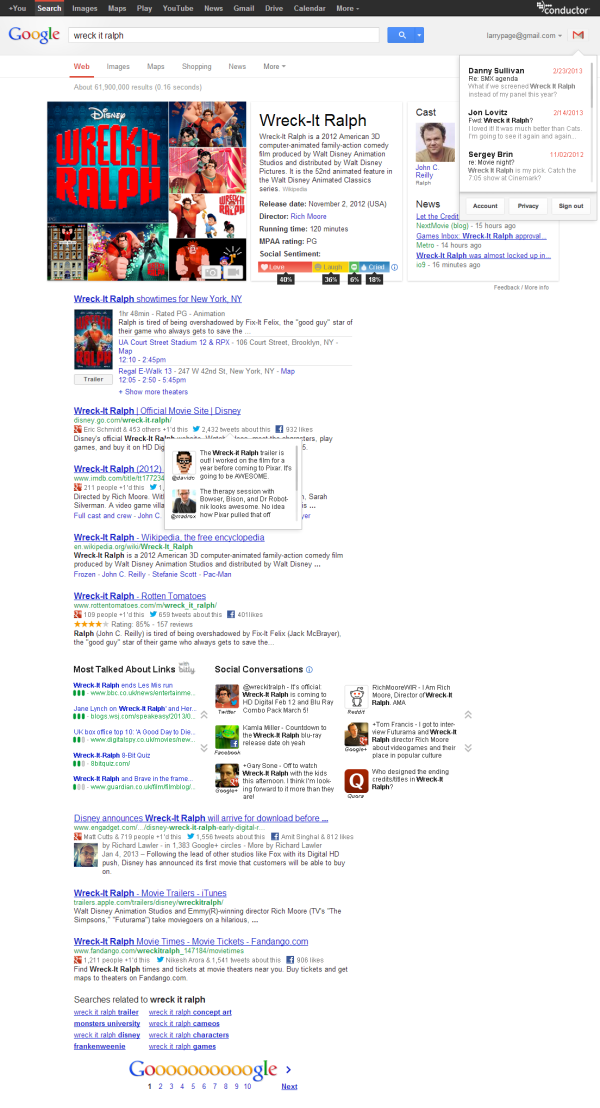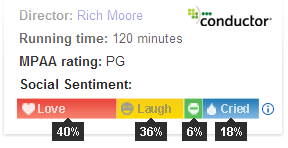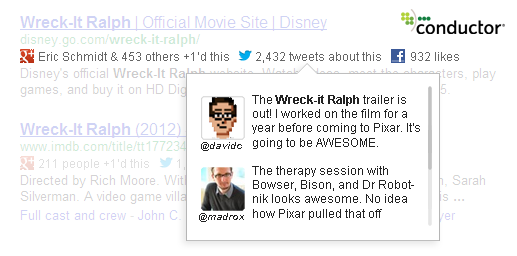The Search Engine We REALLY Want To See Google (Or Microsoft) Build
When you sit down and think about it, search engines today have not changed all that dramatically in terms of depth-of-insight compared to their early days. Google recently added the Knowledge Graph for a subset of queries; but at its core, the level of insight available to the searcher remains primarily the Web links on […]
When you sit down and think about it, search engines today have not changed all that dramatically in terms of depth-of-insight compared to their early days. Google recently added the Knowledge Graph for a subset of queries; but at its core, the level of insight available to the searcher remains primarily the Web links on the SERP.
Yet, Google is looking to change that. With the addition of the Knowledge Graph, Google has announced its intention to evolve from a ‘search engine’ to a ‘knowledge engine.’ Matt Cutts said as much at an industry conference late last year, explaining Google is so committed to this evolution they renamed Google’s ‘Search Quality’ team the ‘Knowledge Team.’
Although they have taken some steps forward, there are definitely elements holding them back from stepping fully into becoming a true knowledge engine. For the sake of clarity, we’ve grouped our view of the primary challenges into two categories:
- Business: Business issues sometimes get in the way of knowledge dispersion, and this is no exception. Google must be able to strike deals with knowledge owners to include their data in search results. As the on-again off-again marriage with Twitter shows, it can be a messy business.
- Technical: There are technical challenges in becoming a Knowledge Engine. When it comes to things like extracting insight from social data, sentiment analysis is hard. Machines must be able to understand context and meaning from small bits of data like a 140 character tweet, parse the nearly infinite ways people have in talking about things, and present it all in a comprehensible way. While the technology has made steps forward in this regard, it is still imperfect.
Thinking Beyond The Present-Day Google
The thing about using a product for a long period of time is that it can sometimes be hard for users to conceptualize what life might be like if constraints holding it back from evolving were lifted. For many, online search has always been a page of links, more recently evolving to include the Knowledge Graph; but with years of use, we have been conditioned to think about search within the confines of its limitations.
Here at Conductor, we thought it would be fun to set aside those limitations and think about what online search could be. In doing so, we set aside both the business limitations and those technical limitations we thought would be theoretically solvable in the near to mid-term that currently prevent it from becoming a true knowledge engine.
Our Four Categories Of Google Search Changes
We used the Google SERP for the movie ‘Wreck It Ralph’ as a starting point for our newly designed search results page, both because it has a Knowledge Graph entry and because it is a query that is timely.
The changes we made fall into one of four categories:
- Social Sentiment: We’ll dive into more details on the specifics below, but one key aspect we added to the SERP was deep insight into what and how people are talking about the query. We created a mechanism for searchers to get both a broad view of social sentiment, and a more detailed view of actual commentary on the query.
- Social Discussions: We also added a section that highlights the most talked-about links relevant to the query and a view of what people across all major social networks are saying about it.
- Email Search Integration: Google has previously demonstrated a willingness to add email to their search results, and we thought if they were going to evolve into a knowledge, rather than search engine it makes sense to include email as one data source. Users who prefer not to include it, could, of course, easily turn it off.
- User Interface: While the focus of our thought experiment was geared more toward re-imagining Google without the limitations described above, than a complete visual redesign that would be better left to professional design firms, we made some user interface adjustments such as moving Knowledge Graph elements from the right column to the top.
Social Sentiment Meter
One of the key improvements in our new SERP is the addition of social sentiment insight into the query. For example, in this case, we want to see on the SERP itself what people thought of the movie. We want to know more than just ‘like-dislike’, we want insight into the wide range of responses people might have to a movie such as ‘Loved-it,’ ‘Hated-it,’ ‘Laughed,’ ‘Cried,’ etc. (the categories would be dynamic based on the query type). And, we want the analysis to be platform agnostic, mined from all social networks such as Twitter, Facebook, Google +, and even LinkedIn when applicable to the query.
Social Share On The URL Level
We also want to know what is being said on the social networks about the links on the search page. For example, in the callout below, clicking on the tweets icon under Disney’s trailer site will show the most popular tweets that include that URL.
Social Conversations Featuring External Data Sources
The social conversations section of the SERP will give us the most-talked-about conversations about the query in question. Google could leverage the major social networks, but also other sources such as Reddit, Quora and others.
In an example that leverages an outside data partner, the “Most Talked About Links” could be the links from a reliable data source such as bitly’s realtime project that aggregates the most-talked-about links about the search term.
The Future of Search Might Be Closer Than We Think
Now, we know not every innovation will work out for every query type. But hopefully, this article will spark some thinking around what online search could be if many of the business and technical hurdles are overcome.
(It may not be as far off as we might imagine. Technology is making progress and many business issues are surmountable, given the right motivation. There was a time when nobody believed Steve Jobs could get the music industry to shift to selling their music electronically.)
This may be the tip of the iceberg of what Google could be as they evolve into a knowledge engine and if they are successful in not just thinking outside the box, but throwing the box out entirely.
Imagine if we thought about the search results with no restriction on data partnerships. What would transactional query SERPs look like? How about navigational? Taking it a step further (while it’s understandable that, at the end of the day, Google is a business, and they are interested in emphasizing their own properties when possible), what if they treated all data sources in the SERPs — whether social networks, shopping sources, etc. — as equals and just asked ‘what is uncompromisingly the best experience for the user?’ How would the SERPs change?
Why Not Bing?
A final thought.
Until now, we have been mostly talking about how Google could take some mighty steps forward to evolve more fully into a knowledge engine. But, a Slate article on Microsoft’s recent ‘Scroogled’ campaign makes some cogent points about why Bing has been stuck at 16% market share, making little headway against the incumbent Google:
“The problem with Microsoft’s online service offerings isn’t that their TV campaigns are lame. It’s not even that the products are bad. But they’re not wildly better than Google’s search and email and so forth. Most people are just incredibly lazy. It’s easy to forget, but it took Google Search and Gmail a remarkably long time to rise to dominance during a period when they wiped the floor with the competition on the merits. Now, Google has that change-aversion and laziness working in its favor. To beat them, you have to crush them on quality. And Microsoft’s not doing that. No ad campaign can overcome the basic reality of human inertia.”
And John Gruber’s comments on this over on Daring Fireball:
“That’s the core problem with a lot of Microsoft’s products, like Windows Phone and Surface. They’re good products, but there’s no holy sh%$! in them. When you’re an upstart in any market, you need a disruptive product. That’s what happened with the iPhone and iPad for Apple, and with web search and Gmail for Google.”
If Microsoft is, indeed, serious about giving searchers a reason to shift to Bing maybe they should be the one to craft their own data partnerships, make headway on the tech limitations, build their own true knowledge engine and create their own holy sh&*! moment. They are up against a competitor whose brand has become a verb for searching the Web; so, the argument that they will need just such a motivator to induce switch would seem to have merit.
Dreams Are The Starting Point For Innovation
At the end of the day, it’s easy to play armchair Product Manager. And, I know that ultimately, Google, Microsoft and any potential data partners are businesses with an end goal of revenue growth and shareholders to satisfy; but, a guy can dream. :)
Let us know in the comments what you think of some of the changes we proposed, awesome data partnerships you would love to see Google or Microsoft forge, or other ways you’d like to see them evolve toward becoming a Knowledge Engine.
Opinions expressed in this article are those of the guest author and not necessarily Search Engine Land. Staff authors are listed here.
Related stories
New on Search Engine Land



